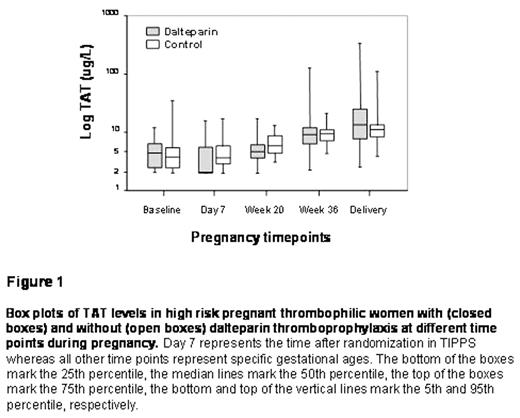Abstract
Background: Low-molecular weight heparin (LMWH) is increasingly being used for prophylaxis of venous thromboembolism (VTE) and prevention of pregnancy associated morbidity in pregnant women with thrombophilia.
Objective: We sought to determine if the administration of prophylactic doses of LMWH down regulates coagulation activation in high risk pregnant women with thrombophilia.
Methods: This sub-study was planned as part of a randomized open label controlled trial (Thrombophilia in Pregnancy Prophylaxis Study (TIPPS)) in which patients at high risk of pregnancy complications with confirmed thrombophilia are randomized to receive either dalteparin (5000 units/day until 20 weeks then 5000U q12h until 37 weeks or onset of labor) or no treatment. Blood samples were collected at baseline, day 7–9 (after starting study drug), week 20 (before increasing study drug), week 36 (prior to stopping study drug) and at the time of admission to the labor and delivery unit. Samples were not drawn at fixed times in relation to drug injection. These samples were analyzed for levels of thrombin-antithrombin complexes (TAT), prothrombin fragments 1+2 (F1+2), D-dimer and anti-Xa activity. Generalized linear mixed models were used for statistical analysis and model results were controlled for age, smoking status, type of thrombophilia and predisposing risk factors. The effect of dalteparin on TAT levels was defined as the primary outcome.
Results: Of one hundred ninety eight patients eligible, 114 were enrolled in TIPPS. Seventy four were eligible for the TIPPS coagulation activation sub-study and randomized. Twenty-three patients were analyzed in the treatment group (dalteparin) and 28 patients in the control group (no intervention). Levels of coagulation activation factors F1+2, TAT and D-dimer increased significantly throughout pregnancy in both groups (p<0.0001). Dalteparin prophylaxis resulted in a significant increase in anti-Xa activity through pregnancy (p<0.0001) compared to controls. Dalteparin had no significant effects on the levels of TAT, F1+2 and D-dimer throughout pregnancy in thrombophilic women (figure 1). A post hoc Monte Carlo power analysis revealed that our study had over 99% and 64% power to detect reductions in TAT values on treatment of respectively 50% and 25%.
Conclusion: Prophylaxis with dalteparin at doses used in this study did not reduce coagulation activation in high risk thrombophilic women during pregnancy.
Box plots of TAT levels in high risk pregnant thrombophilic women with (closed boxes) and without (open boxes) dalteparin thromboprophylaxis at different time points during pregnancy. Day 7 represents the time after radomization in TIPPS whereas at other time points represent sepcific gestational ages. The bottom of the boxes mark the 25th percentile, the median lines mark the 50th percentile, the top of the boxes mark the 75th percentile, the bottom and top of the vertical lines mark the 5th and 95th percentile, respectively.
Box plots of TAT levels in high risk pregnant thrombophilic women with (closed boxes) and without (open boxes) dalteparin thromboprophylaxis at different time points during pregnancy. Day 7 represents the time after radomization in TIPPS whereas at other time points represent sepcific gestational ages. The bottom of the boxes mark the 25th percentile, the median lines mark the 50th percentile, the top of the boxes mark the 75th percentile, the bottom and top of the vertical lines mark the 5th and 95th percentile, respectively.
Disclosures: Off label use of dalteparin to prevent placenta mediated pregnancy complications.; Doctors Rodger, Wells, Kahn, Kovacs and Solymoss have participated on Pfizer Advisory Boards and received compensation for this participation.; The TIPPS study was partially funded by Pharmacia (now Pfizer) in the form of an unrestricted grant. This support was withdrawn when Pfizer acquired Pharmacia in 2004. Pfizer was not involved in the design, analysis or interpretation of the study that is the subject of this manuscript. Doctors Rodger, Wells, Kovacs and Rey have received grant funding from Pfizer. Pfizer is the current manufacturer of dalteparin.; Doctors Rodger, Wells, Solymoss, Kovacs and Kahn have received honoraria for lectures.
Author notes
Corresponding author


This feature is available to Subscribers Only
Sign In or Create an Account Close Modal